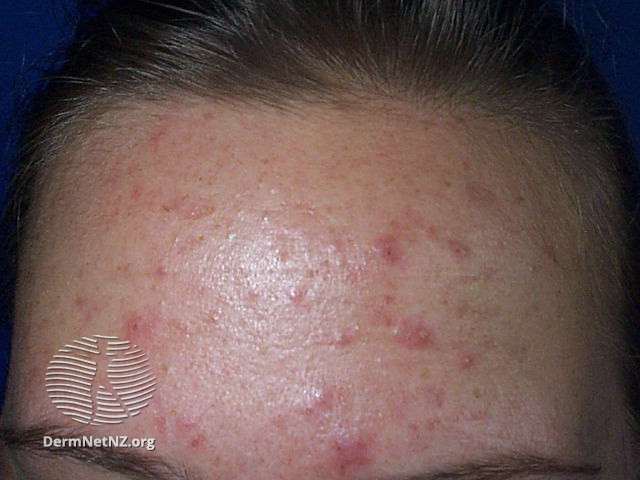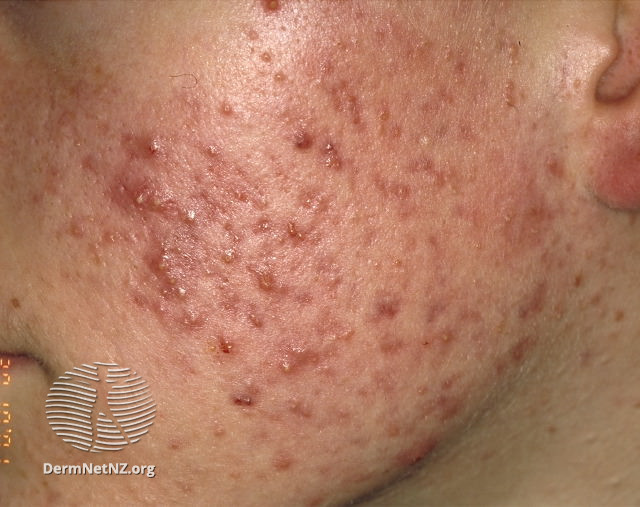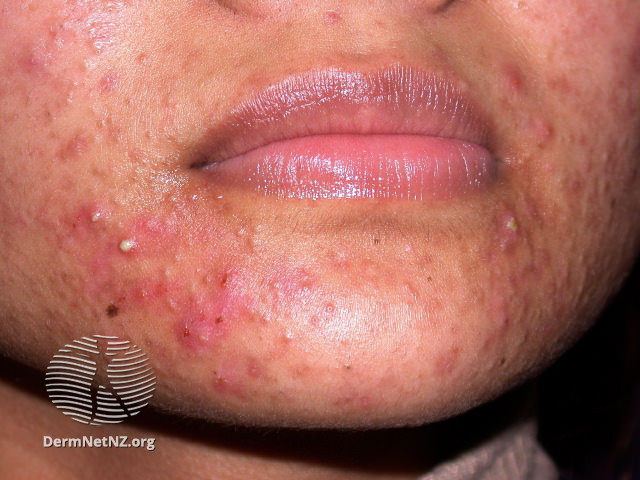Mild Acne: 
Photo Credit : DermNetNZ.org Source: Image index | DermNet (dermnetnz.org)
Severe Acne: 
Photo Credit : DermNetNZ.org Source: Acne Vulgaris: Features, Types, and Treatments — DermNet (dermnetnz.org)
Moderate Acne: 
Photo Credit: DermNetNZ.org Source: Image index | DermNet (dermnetnz.org)
R.C 18-05-23
Dermatology Referral Criteria
- Severe nodular/cystic acne with scarring
- Treatment failure:
- For consideration of oral Isotretinoin for patients with a poor response to at least six months of two or more different antibiotics plus topical therapy
- Severe psychological upset
- Consider starting females of reproductive potential on combined hormonal contraception at point of referral if appropriate.
- Refer children at over the age of 16 on the date of referral to Adult Dermatology
Mild to Moderate Acne
Patients with mild to moderate acne can usually be managed in Primary Care. Prolonged treatment may be required with regular review to encourage patient compliance.
Patients should be advised to use a non-comedogenic moisturiser if needed.
Topical Treatment for 3 months then review
- Benzoyl peroxide
Helpful where inflammatory papules/pustules predominant.
Starting Benzoyl peroxide at 2.5% and increasing to 5% or 10% may reduce irritant effects.
Topical treatment takes at least 30 days to become effective
May bleach clothing - Retinoids:
Adapalene, Isotretinoin, Tretinoin – helpful if either comedones or papules predominant. Cream form is often better tolerated than gel and the area and duration of treatment may have to be slowly increased over 2-3 weeks to avoid widespread initial irritation.
Adapalene is generally better tolerated than other topical retinoids.
- Combination topical treatments with antibiotic, benzoyl peroxide, retinoids or zinc.
Avoid topical antibiotics alone to avoid anti-microbial resistance.
Helpful in inflammatory acne where papules/pustules predominant. Treatments on LJF include:
EpiDuo® gel (adapalene 0.1% and benzoyl peroxide 2.5% gel) is a combination product recommended first line in the treatment of mild acne that is mostly inflammatory in nature.
Duac® Once Daily gel (benzoyl peroxide 5% and clindamycin 1%)
Treclin® gel (clindamycin 1% and tretinoin 0.025%) is a combination product for the treatment of acne when comedones, papules and pustules are present.
Females of child bearing age must use effective contraception when using topical retinoids and related drugs (oral progestogen-only contraceptives not considered effective according to the BNF).
Moderate to Severe Acne
Oral antibiotics are the mainstay of systemic treatment in Primary care. These should not be prescribed in isolation and topical BPO or retinoid should be prescribed in addition.
Assess response to oral antibiotics at three months. If poor response, change to alternative oral antibiotic but continue for six months minimum if a reasonable response achieved.
Under 12 years old:
- Erythromycin or Clarithromycin 250mg twice daily
12 years and over:
- Doxcycline 100mg once daily
- Lymecycline 408mg once daily
- Erythromycin or Clarithromycin 500 mg twice daily
- Minocycline may have additional side effects so is not a preferred second line treatment.
- Trimethoprim 300mg twice daily can be used (off licence) if other antibiotics have not worked.
- Consider prescribing spironolactone (off licence) start with 50mg OD for 4 months, then if helping but not clearing acne, it can be increased to 100mg OD for another 4 months. There is no need for U&Es monitoring if there are no other co-morbidities.
Remember that tetracyclines should be avoided in patients who are pregnant or may become pregnant whilst on treatment.
In Women
Consider additional anti-androgen treatment in combination with oestrogen e.g. co-cyprindiol. The progesterone only pill and progesterone implants may make acne worse.
Severe Acne
Commence systemic antibiotic therapy and refer immediately for consideration of systemic isotretinoin, indicating the reasons justifying an urgent referral. Please remember systemic isotretinoin may not be necessary and the consultant dermatologist will make the decision on best management for the individual.
Do NOT stop treatment whilst patient is waiting to be seen.
Many patients require long term maintenance, either in the form of regular topical therapy or topical therapy PRN for flare
For Patients
https://www.bad.org.uk/pils/acne/
For Health Professionals
Link to PCDS guidance on Acne Vulgaris
http://www.dermatology.nhs.scot/dermatology-pathways/pathways/acne/
info on spirononlactone use in acne
http://www.bad.org.uk/shared/get-file.ashx?id=6212&itemtype=document













